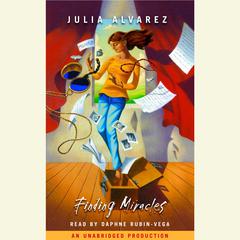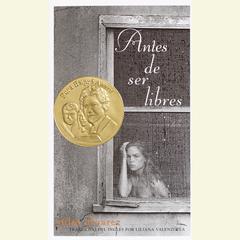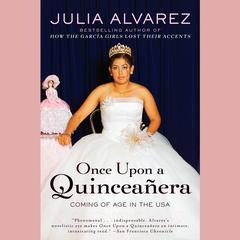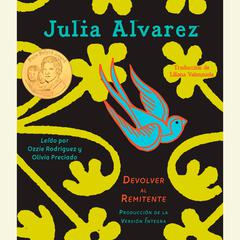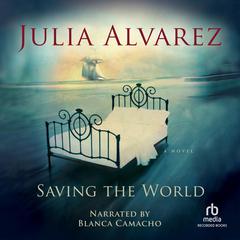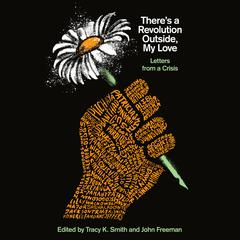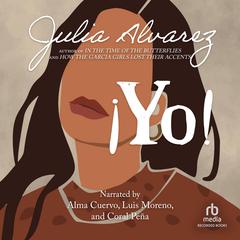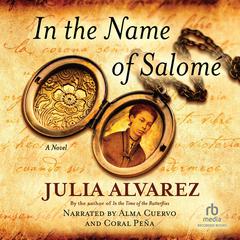 Play Audiobook Sample
Play Audiobook Sample
How the Garcia Girls Lost Their Accents Audiobook
 Play Audiobook Sample
Play Audiobook Sample
Quick Stats About this Audiobook
Total Audiobook Chapters:
Longest Chapter Length:
Shortest Chapter Length:
Average Chapter Length:
Audiobooks by this Author:
Publisher Description
Hailed by the Los Angeles Times as "simply wonderful" How the Garcia Girls Lost Their Accents captures the vivid lives of the Garcia sisters, four privileged and rebellious Dominican girls adapting to their new lives in America. In the 1960s, political tension forces the Garcia family away from Santo Domingo and toward the Bronx. The sisters all hit their strides in America, adapting and thriving despite cultural differences, language barriers, and prejudice. But Mami and Papi are more traditional, and they have far more difficulty adjusting to their new country. Making matters worse, the girls-frequently embarrassed by their parents-find ways to rebel against them. A touching coming-of-age tale, this enthralling book perfectly illuminates the intergenerational struggles and multicultural clashes so common to the American immigrant family.
Download and start listening now!
"I read this book for my women's studies class, and I am surprised how much I liked it. The structure is uncommon and at times it was difficult to capture how the narrator was, but it was definitely worth the read."
— Autumn (4 out of 5 stars)
How the Garcia Girls Lost Their Accents Listener Reviews
-
" I did not care for this book....as the saying goes; to every reader her book, every book its reader "
— Annie, 2/17/2014 -
" this is the first book of hers that i've read. it was recommended by my english 2010 prof. it was so truly familiar, funny, disturbing, clever. and it had guayabas... what more could a girl want?! "
— karla, 2/17/2014 -
" Very sweet and touching view to the dynamics of a Dominican family in the U.S. "
— Nicole, 1/30/2014 -
" Wonderfully well written and engaging. Thought-provoking too. I'm still trying to figure out what it was all about. "
— Miriam, 1/30/2014 -
" This is a quick and very enjoyable read! "
— Leslie, 1/28/2014 -
" I'm a fan of Julia Alvarez and so in good conscience I can't rate this book anything less than three stars. I actually didn't like the way the stories jumped around from different perspectives. If done correctly, it's captivating like The Joy Luck Club (5 stars, obviously) but I wasn't engaged in their stories and I only finished out of respect for the author. "
— Erin, 1/25/2014 -
" This was a great book and I can't wait to read more by Julia Alvarez. "
— Andrea, 1/21/2014 -
" easy, engaging read about immigrant family. "
— Lillian, 1/20/2014 -
" Meh. I thought I would love it, but ...Meh. "
— Lily, 1/13/2014 -
" Eh. Nice writing and some lovely metaphors, but the class elitism and casual racism of the book was a bit much for me. I'm very surprised to learn it's marketed as a young adult book though! "
— Carmen, 12/26/2013 -
" An incredibly captivating story about family, relationships, migration, self, and place. Now, among my favorites. "
— Richael, 12/20/2013 -
" I loved In the Time of the Butterflies, but could not get into this book. "
— kenpen, 12/5/2013 -
" I read this book mostly while I was at work and I was not a fan of it... It moved backwards and I don't feel like their was enough development with any of the characters or plots... I actually liked the end more than the beginning "
— Keli, 12/2/2013 -
" Time frame: 1956-1989, immigrant family story told in three chapters, reverse chronological order. "
— Cynthia, 11/25/2013 -
" Even after finishing this book I wouldn't recommend it to anyone. There was really no plot. It was basically a whole bunch of short stories about the four Dominican sister's lives. The book went backwards in time from their adulthood in America to their childhood in the Dominican Republic. "
— Lexi, 11/20/2013 -
" Carla, Sandra, Yolanda, and Sofia are going to be on a journey to the United States fron the Dominican Republic. In 1960 they immigrate to New York where life begins though for them. "
— Rosa, 9/2/2013 -
" The constant changes in voice made the whole novel feel disjointed to me. I felt like I couldn't connect with any one character or their experience. "
— Britt, 7/10/2013 -
" Yo is the most interesting character in this. At times it sort of felt like the author was trying to give all the girls equal screen time, but she was only particularly interested in Yo. "
— Sphinx, 6/22/2013 -
" A well written piece that takes a fresh look at the immigrant experience and uses crafty literary devices to exemplify the transition in identity and personality that occurs for many immigrants. My only problem: it feels false and construed at times. "
— Saeed, 5/10/2013 -
" A series of short stories that move from present to past in the characters' lives, this was readable and somewhat interesting, but it certainly wasn't a page turner like some of her other books. "
— Kate, 1/16/2013 -
" this book felt rather disjointed, but the stories were intriguing. The approach of going back from the present was my biggest challenge. "
— Stef, 1/12/2013 -
" Loved it! Can't wait to read her other books. "
— Joanna, 6/25/2012 -
" Loved this book!!! Great stories, great family. I loved the bit about "studying like cats and dogs" and use that term to this day. "
— Devika, 4/9/2012 -
" The book was well-written and broadened my horizons, and I would certainly recommend it; that said, the style in which it was presented (a series of vignettes, going backwards in time, each from the perspective of a different person) was not really satisfying for me, personally, to read. "
— Coral, 3/10/2012 -
" The ending of this book made me so mad I don't even want to talk about it. "
— Margot, 12/19/2011 -
" Her prose is like poetry to me. Life for a child before and after immigrating suddenly to the U.S., leaving a dictator regime behind and some more family. "
— Trazko, 9/15/2011 -
" I remember loving this book, but I was 12 at the time I read it. It was my introduction to Latin American literature and I was really excited when my mom gave it to me off of her overflowing bookshelves. "
— Melina, 6/23/2011 -
" I really kept thinking this book would pull itself together, but I just didn't get much out of it. "
— Sharlene, 5/20/2011 -
" Has a Boringg Start But then it getts interestingg towarddd the middle. "
— Frances, 5/13/2011 -
" Loved the second to last chapter the most! Cleverly written. "
— Courtney, 5/8/2011 -
" It was original and funny and interesting and different.<br/><br/>I just didn't love it. "
— Tim, 5/1/2011 -
" Has anyone read this book....I want to know a bit more of it "
— Wanda, 4/10/2011 -
" A thoughtful and enjoyable story of four sisters, uprooted from their family enclave in the Dominican Republic and transplanted to New York, trying to make sense of the world they live in. "
— Barbara, 4/2/2011 -
" Meh. Just didn't draw me in. There were some great segments and some weird segments, but I guess I was expecting something different. Interesting glimpse into life in the Dominican Republic, though. "
— Megan, 3/30/2011 -
" Even after finishing this book I wouldn't recommend it to anyone. There was really no plot. It was basically a whole bunch of short stories about the four Dominican sister's lives. The book went backwards in time from their adulthood in America to their childhood in the Dominican Republic. "
— Lexi, 3/24/2011 -
" After reading another one of Alvarez's books, I was looking forward to this one. It started off promising with details of family traditions and a Latin way of life, but I soon became bored. I disliked all the shifting of storytellers. I also didn't like all the sexual stories and references. "
— Lisa, 3/21/2011
About Julia Alvarez
Julia Alvarez grew up in the Dominican Republic before immigrating to the United States at the age of ten. She now lives in Vermont, where she is a writer-in-residence at Middlebury College, Vermont.
Julia Álvarez vivió su infancia en República Dominicana hasta 1960, cuando emigró a los Estados Unidos. Luego de obtener sus títulos de pregrado y postgrado en literatura y creación literaria, enseñó poesía durante muchos años y publicó su primer libro de poemas, Homecoming, en 1984. Ha recibido becas del Fondo Nacional para las Artes y de la Fundación Ingram Merrill. De cómo las muchachas García perdieron el acento recibió el premio PEN Oakland/Josephine Miles en 1991, que se entrega a obras que presentan un punto de vista multicultural. En la actualidad, enseña literatura inglesa en Middlebury College.





